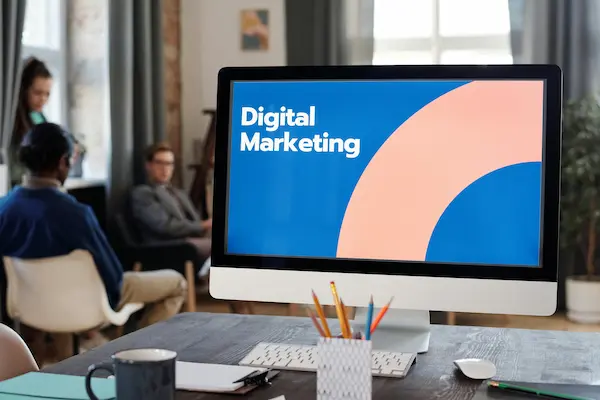What Digital Marketing Is?
In today’s digital age, businesses of all sizes are striving to connect with potential customers online. The process that makes this connection possible is digital marketing. But what exactly is digital marketing, and how can it benefit your business?
Digital marketing is the umbrella term for all marketing efforts that use the internet or electronic devices. It encompasses strategies like search engine optimization (SEO), social media marketing, email marketing, paid advertising, and content marketing. The goal is to promote products or services to an online audience and build relationships with potential and existing customers.
With people spending more time online than ever before, understanding what digital marketing is and how to leverage it effectively is crucial for any business that wants to succeed in the modern marketplace.
In this comprehensive guide, we’ll explore what digital marketing is, its key components, and why it’s essential for your business in 2024.
The Core Elements of Digital Marketing
Digital marketing is a broad field with many different components that work together to achieve a common goal: reaching and engaging with your target audience. Here are the key elements that define what digital marketing is:
Search Engine Optimization (SEO)
One of the most well-known aspects of digital marketing is search engine optimization (SEO). SEO is the process of optimizing your website and content to rank higher in search engine results pages (SERPs). When people search for products, services, or information related to your business, SEO helps your website appear more prominently in search results.
How SEO Works:
Search engines like Google use complex algorithms to determine which websites are the most relevant and valuable for users. SEO involves optimizing various aspects of your website, including keywords, content quality, user experience, and technical performance, to align with these algorithms.
Why SEO Matters:
The higher your website ranks in search results, the more likely it is that people will click on it. Since the majority of online experiences start with a search engine, SEO is one of the most effective ways to drive organic traffic to your site without paying for ads.

Social Media Marketing
Social media platforms like Facebook, Instagram, LinkedIn, and Twitter have become essential tools for digital marketers. Social media marketing involves using these platforms to promote your brand, interact with your audience, and build a community around your products or services.
How Social Media Marketing Works:
Businesses use social media to share content, run advertisements, and engage with followers. This type of marketing is powerful because it allows for direct interaction between businesses and consumers, creating opportunities for real-time engagement, feedback, and brand loyalty.
Why Social Media Marketing Matters:
With billions of people using social media every day, these platforms offer a massive opportunity to reach a wide audience. Social media marketing helps businesses increase brand awareness, drive website traffic, and boost sales through direct communication with customers.
Content Marketing
At the heart of digital marketing lies content marketing. Content marketing is the creation and distribution of valuable, relevant content designed to attract and engage a specific audience. The purpose of content marketing is not just to promote products but to offer solutions and information that help your audience solve problems.
How Content Marketing Works:
Businesses create blog posts, videos, infographics, eBooks, and other types of content to provide value to their audience. When done correctly, this content positions the business as an industry expert, builds trust, and keeps potential customers engaged.
Why Content Marketing Matters:
Content marketing is essential because it builds long-term relationships with your audience. By offering helpful and relevant content, businesses can attract visitors to their website, build brand authority, and nurture leads into paying customers.
Paid Advertising (PPC)
While SEO and content marketing focus on organic traffic, paid advertising, also known as pay-per-click (PPC), is a strategy that allows businesses to buy traffic to their website. The most popular platforms for paid advertising include Google Ads, Facebook Ads, and Instagram Ads.
How Paid Advertising Works:
Businesses create ads that appear on search engines, social media platforms, or other websites. With PPC, you only pay when someone clicks on your ad. This makes it a cost-effective way to reach your target audience and drive traffic to your website.
Why Paid Advertising Matters:
Paid advertising can yield immediate results by driving traffic and generating leads quickly. It’s especially useful for businesses looking to promote time-sensitive offers, new products, or seasonal campaigns.
Email Marketing
Another key element of digital marketing is email marketing. Email marketing involves sending targeted emails to a list of subscribers with the goal of nurturing relationships, promoting products or services, and driving conversions.
How Email Marketing Works:
Businesses use email campaigns to share news, special offers, personalized recommendations, and other content that’s relevant to their audience. Email marketing is a direct form of communication that allows businesses to engage with customers who have already expressed interest in their products or services.
Why Email Marketing Matters:
Email marketing has one of the highest returns on investment (ROI) of any digital marketing strategy. It’s a powerful way to stay connected with your audience, provide valuable content, and encourage repeat business.

Why Digital Marketing Is Essential for Business Success in 2024
Now that you understand the core components of digital marketing, let’s look at why it’s critical for businesses to embrace digital marketing strategies in 2024.
Consumers Are Online
The most obvious reason why digital marketing is essential is that your customers are spending more time online than ever before. With the increasing use of smartphones, social media, and the internet in general, the way people shop and interact with brands has fundamentally changed. Digital marketing allows you to meet your customers where they are—online.
Targeted Advertising
One of the biggest advantages of digital marketing over traditional marketing methods is the ability to target specific audiences. Whether through SEO, social media ads, or email campaigns, digital marketing allows you to hone in on the people most likely to be interested in your products or services. This means you can deliver highly relevant content and offers that are more likely to result in conversions.
Measurable Results
Unlike traditional marketing efforts, which can be hard to measure, digital marketing offers precise data and analytics. Whether you’re tracking website visits, conversion rates, or social media engagement, digital marketing provides real-time insights into what’s working and what needs improvement. This data-driven approach allows businesses to make smarter decisions and optimize their marketing strategies for better results.
Cost-Effective
Another significant benefit of digital marketing is that it can be much more cost-effective than traditional marketing. Small businesses, in particular, can take advantage of digital marketing strategies like SEO, content marketing, and social media marketing to build their brand without needing a massive advertising budget.
Flexibility and Adaptability
Digital marketing offers a high level of flexibility and adaptability. Whether you’re launching a new product, running a seasonal campaign, or trying to target a specific demographic, digital marketing strategies can be quickly adjusted and fine-tuned to meet your goals. This allows businesses to stay agile and responsive to changing market conditions.
Common Questions About What Digital Marketing Is
- Is digital marketing only for online businesses?
No, digital marketing is not just for online businesses. While it is essential for e-commerce, brick-and-mortar businesses can also use digital marketing to attract local customers, improve brand awareness, and boost sales. Local SEO, Google My Business, and social media marketing are all examples of how physical businesses can leverage digital marketing. - What’s the difference between digital marketing and traditional marketing?
The main difference between digital marketing and traditional marketing is the medium. Digital marketing uses online channels such as websites, social media, and search engines to reach customers, while traditional marketing uses offline methods like print ads, billboards, and TV commercials. Digital marketing is typically more cost-effective, measurable, and targeted. - Can small businesses afford digital marketing?
Yes! One of the great things about digital marketing is that it’s accessible to businesses of all sizes. Small businesses can start with simple strategies like SEO, content marketing, and social media, which are affordable and can yield significant results over time. As the business grows, they can scale their digital marketing efforts. - How long does it take to see results from digital marketing?
The time it takes to see results from digital marketing depends on the strategy. For example, SEO can take several months to start showing results because it relies on organic growth. On the other hand, paid ads or email marketing campaigns can generate immediate results, making them great options for businesses looking for quick wins.
Why Your Business Needs Digital Marketing?
So, what is digital marketing? It’s the process of using online tools and strategies to promote your business, connect with customers, and drive growth. As more people move online, businesses that fail to invest in digital marketing risk being left behind. By leveraging SEO, social media, content marketing, email marketing, and paid ads, businesses can expand their reach, engage their target audience, and ultimately increase revenue.
Whether you’re just getting started with digital marketing or looking to take your strategy to the next level, understanding what digital marketing is and how to implement it effectively is key to success in 2024 and beyond.
